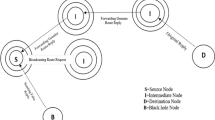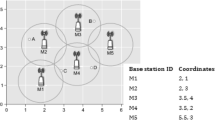Abstract
A delay-tolerant network (DTN) is a network with dynamic topology changes, network partitions and node mobility. Multi-copy routing protocols are usually adopted to overcome these characteristics. Although multi-copy routing protocols can improve the message delivery ratio and reduce the message propagation delay, they also easily exhaust the limited storage space of nodes, resulting in buffer overflows. The major task of buffer management is to determine which message will be discarded when buffer overflows happen. Determining the order of discarding messages will directly affect the performance of the network. In this paper, we propose a novel weight-based buffer management policy (NWBBMP) that divides messages in the node into a priority message queue, a high-weight message queue and a low-weight message queue. When a node receives a new message that causes a buffer overflow, the algorithm determines which queue’s messages will be discarded according to whether the current node is the destination node of the new message. Simulation results show that our algorithm outperforms traditional buffer management algorithms in terms of delivery ratio, average delay and network overhead.







Similar content being viewed by others
References
Wang H, Lv H, Wang H et al (2017) DCAR: DTN congestion avoidance routing algorithm based on tokens in an urban environment[J]. J Sens 2017(2):1–9
Mukherjee J, Ramamurthy B (2013) Communication technologies and architectures for space network and interplanetary internet[J]. IEEE Commun Surv Tutorials 15(2):881–897
Galati A, Bourchas T, Siby S, et al. (2014) Mobile-enabled delay tolerant networking in rural developing regions[C]//global humanitarian technology conference (GHTC), 2014 IEEE. IEEE: 699-705
Hur J, Kang K (2014) Secure data retrieval for decentralized disruption-tolerant military networks[J]. IEEE/ACM Trans Networking (TON) 22(1):16–26
Conti M, Giordano S (2014) Mobile ad hoc networking: milestones, challenges, and new research directions[J]. IEEE Commun Mag 52(1):85–96
Zhu H, Du S, Gao Z et al (2014) A probabilistic misbehavior detection scheme toward efficient trust establishment in delay-tolerant networks[J]. IEEE Trans Parallel Distrib Syst 25(1):22–32
Fraire JA, Ferreyra PA. (2014) Assessing DTN architecture reliability for distributed satellite constellations: preliminary results from a case study[C]// biennial congress of Argentina. IEEE: 564-569
Rashid S, Ayub Q (2010) Efficient buffer management policy DLA for DTN routing protocols under congestion[J]. Int J Comput Netw Secur 2(9):118–121
Silva AP, Burleigh S, Hirata CM et al (2015) A survey on congestion control for delay and disruption tolerant networks[J]. Ad Hoc Networks 25(PB):480–494
Souza C, Mota E, Manzoni P, et al. (2016) Improving delivery delay in social-based message forwarding in delay tolerant networks[C]//proceedings of the 2016 workshop on fostering Latin-American research in data communication networks. ACM: 52-54
Silva AP, Hilário MR, Hirata C M, et al. (2015) A percolation-based approach to model DTN congestion control[C]//mobile ad hoc and sensor systems (MASS), 2015 I.E. 12th international conference on. IEEE: 100-108
Wang K, Guo H, Shu L, et al. (2014) An improved congestion control algorithm based on social awareness in delay tolerant networks[C]//communications (ICC), 2014 I.E. international conference on. IEEE: 1773-1777
Lindgren A, Phanse KS. (2006) Evaluation of Queueing policies and forwarding strategies for routing in intermittently connected networks[C]// international conference on communication system software and middleware, 2006. Comsware. IEEE: 1-10
Kim D, Park H, Yeom I (2008) Minimize the impact of buffer overflow in DTN[C]//proceedings international conference on future internet technologies (CFI): 20-21
Rashid S, Ayub Q, Abdullah AH (2015) Reactive weight based buffer management policy for DTN routing protocols[J]. Wirel Pers Commun 80(3):993–1010
Shen J, Moh S, Chung I et al (2014) Buffer scheme optimization of epidemic routing in delay tolerant networks[J]. J Commun Netw 16(6):656–666
Krifa A, Barakat C, Spyropoulos T. (2008) Optimal buffer management policies for delay tolerant networks[C]//2008 5th annual IEEE communications society conference on sensor, Mesh and Ad Hoc Communications and Networks IEEE, 260–268
Keränen A, Ott J, Kärkkäinen T. (2009) The ONE simulator for DTN protocol evaluation[C]//proceedings of the 2nd international conference on simulation tools and techniques. ICST (Institute for Computer Sciences, social-informatics and telecommunications engineering), 55-64
Mundur P, Seligman M, Lee G (2008) Epidemic routing with immunity in delay tolerant networks[C]// IEEE military communications conference. IEEE:1–7
Li Y, Hui P, Jin D et al (2015) Delay-tolerant network protocol testing and evaluation[J]. IEEE Commun Mag 53(1):258–266
Acknowledgements
This work is supported by the National Natural Science Foundation of China (No. 61402127, 6 1502118 and 61370212), the National Science and Technology Major Project of the Ministry of Science and Technology of China under Grant (No. 2016ZX03001023-005), the Natural Science Foundation of Heilongjiang Province in China (No. F2016028, F2016009, F2015029) and the ZTE Forum (2016ZTE01-03-06).
Author information
Authors and Affiliations
Corresponding author
Rights and permissions
About this article
Cite this article
Wang, H., Wang, H., Feng, G. et al. NWBBMP: a novel weight-based buffer management policy for DTN routing protocols. Peer-to-Peer Netw. Appl. 11, 917–923 (2018). https://doi.org/10.1007/s12083-017-0597-x
Received:
Accepted:
Published:
Issue Date:
DOI: https://doi.org/10.1007/s12083-017-0597-x




